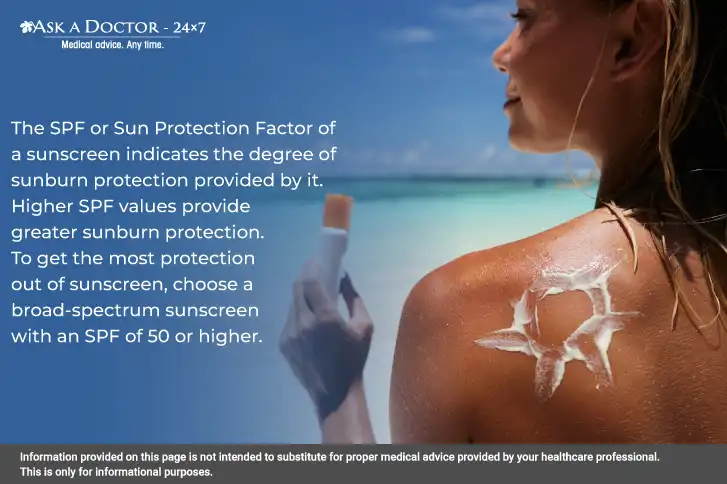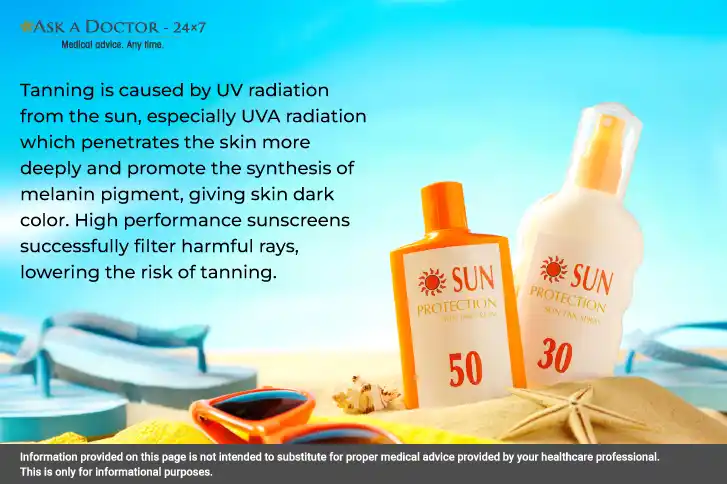How Do High-performance Sunscreens Prevent Sun Damage And Tanning
Do you know that both UVA and UVB rays from the sun can cause deeper layers of skin damage and are connected to longer-term problems, including skin cancer and premature ageing? One of the most essential skincare products that every person should use regularly is sunscreen. Sunscreen serves to create a strong barrier that shields your skin from UV damage. In essence, sunscreen functions by reflecting or absorbing damaging UV radiation. It stops them from getting into the skin and causing accelerated ageing, skin cancer, sunburns, and other problems.
In this blog, we cut through the noise and dig into the science to find the benefits of daily sun protection. So, is sunscreen truly non-negotiable? Let’s find out!
What is a Sunscreen and How It Functions?

Sunscreen is a lotion, spray, gel, or other topical preparation that absorbs or reflects some of the sun's ultraviolet (UV) rays to shield the skin against sunburn and other skin damage. It is also referred to as sunblock. The Sun Protection Factor (SPF) is the term that explains the degree of defense against harmful UV rays (UVA and UVB radiation), which cause sunburn. It is observed to gauge the effectiveness of any sunscreen. High-performance sunscreen is a broad-spectrum sunscreen, which means that the sunscreen can protect your skin from both types of harmful UV radiation.
The American Academy of Dermatology (AAD) recommends selecting a sunscreen with an SPF rating of 30 or higher. Also, it is advised to use water-resistant sunscreens. It will stay on wet or sweaty skin for a while before you need to reapply. Also, many high-performance sunscreens are designed to be non-greasy and quickly absorbed, making them suitable for various skin types.
There are primarily two ways in which sunscreen works: chemical and physical.
Chemical-based sunscreen
Well-known sunscreens with chemical bases function by absorbing ultraviolet (UV) radiation and changing it before it has a chance to do any harm. Sunscreens that contain chemicals have octisalate and oxybenzone.
Physical-based sunscreen
Physical-based versions scatter and reflect UV rays away from your skin. Two examples of blocking substances included in physical sunscreen are zinc oxide and titanium dioxide. Both zinc oxide and titanium dioxide are mineral sunscreens that provide broad-spectrum protection.
The Connection Between Tanning and Sunscreen

Sunscreen is crucial in protecting skin against damage because it acts as a barrier against the sun's powerful UV radiation. One concern with sunscreen that comes to almost every mind is how it actually affects the tanning process. Scientists explain, "to shield the deeper layers of skin cells from harm, the skin produces more melanin in response to UV exposure, a process known as tanning". Although many people want to get a bronzed appearance via tanning, it's vital to understand the negative health effects of UV exposure. Understanding how sunscreen protects the skin, the various types of sunscreen available, and their impact on the skin's tanning capacity are all essential components of comprehending the relationship between sunscreen and tanning.
Does Tanning Prevention Work with Sunscreen?
Sunscreen can stop tanning to a large degree. When used properly, sunscreen protects the skin by absorbing, reflecting, or dispersing sunlight, which lowers the quantity of UV rays that reach the skin. As a result, less melanin is produced, which reduces tanning. Since they cover the entire spectrum of UV radiation that causes skin damage and tanning, broad-spectrum, high-performance sunscreen offers protection against both UVA and UVB rays, preventing the tanning process. Even with sunscreen, tanning can still happen because no sunscreen can completely filter UV radiation. The degree of tanning can also be influenced by a variety of factors, including the Sun Protection Factor (SPF), how often you reapply sunscreen, and how much you apply.
How Can You Prevent Sun Damage to Your Skin?
To prevent UV damage to your skin, you can take a variety of precautions. The following are some efficient methods to shield your skin from the sun's damaging rays while maintaining its health:
1. Use Sunscreen: Putting on sunscreen is the most crucial step in protecting your skin. Apply a generous amount of sunscreen to all sun-exposed body regions (face, neck, and ears), using a product with an SPF of at least 30. Apply sunscreen twice a day, half an hour before you go outside, for complete protection. The majority of people don't use adequate sunscreen. If you're covering your full body, adults should aim to apply 6 to 8 tablespoons of sunscreen.
2. Reapply Sunscreen: If you are exposed to the sun, remember to reapply sunscreen every two to three hours. You should also do this right away after swimming or perspiring. Select a sunscreen with broad-spectrum protection to guard against UVA and UVB radiation.
3. Dress Protectively: Cover as much of your skin as you can with airy, light clothing. By doing this, you can shield your skin from the damaging effects of the sun.
4. Seek Shade: Make every effort to walk in the shade. Steer clear of direct sunlight, especially during busy times, and use umbrellas or other covers as needed.
5. Wear Sunglasses: Now that your skin is protected, don't forget your eyes. Wear sunglasses that provide 100% UV protection to avoid any sun damage to your eyes.
Conclusion
Hence, high-performance sunscreens offer broad-spectrum protection against both UVA and UVB rays, typically with an SPF of 30 or higher. They are intended to stop premature ageing, sunburn, and skin damage. They offer protection from both UVA and UVB radiation. At least 97% of UVB rays should be blocked by sunscreen with an SPF of 30 or higher. Water-resistant formulations of high-performance sunscreens offer continuous protection when swimming or perspiring. Since many high-performance sunscreens are made to be swiftly absorbed and non-greasy, they can be used on a variety of skin types. It is recommended to consult a dermatologist who can assess your skin and suggest the best sunscreen for your specific skin type and any underlying conditions, especially if you have sensitive or oily skin.
If you have any questions related to sunscreen use, you can Ask a Dermatologist at Ask a Doctor, 24x7.
Recently Answered Questions Related to Sunscreen and Skincare
- Does Long Sun Exposure In Pregnancy Cause Any Harm To The Fetus?
- Organic Day Moisturizer, With Sun Protection, For Normal Skin. Product Names?
- Side Effects Of Sunscreen
- Suggest Medication For Protection From Sunburn
- Is Clinique Safe To Use As A Cleanser For Blemish Pore Skin?
- Can Sun Protection Be Used While On Penicillin V?
- Suggest Remedies For Acne And Protection From the Sun
- Suggest the Safest Alternative For Lip Protection From the Sun
Disclaimer: Information provided on this page is not intended to substitute for proper medical advice provided by your healthcare professional. This is only for informational purposes.
Ask a Specialist
Recent Questions


